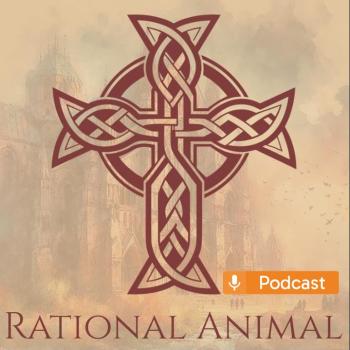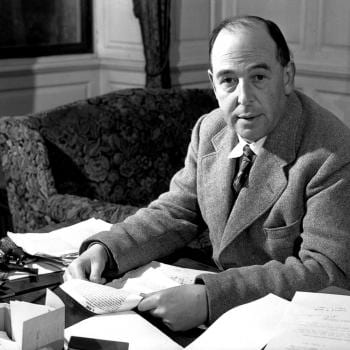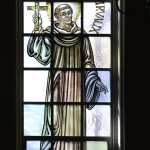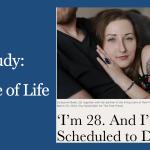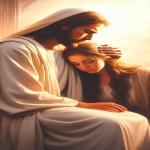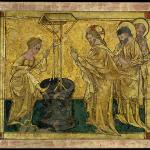Tuesday’s Gospel, from Matthew, is a big dose of detachment. We’re told it is easier for a camel to pass through the eye of a needle than it is for the worldly to enter the kingdom of God. Like the jarring Gospel from Sunday, and the instruction to sell everything and follow yesterday, we sure need to hear it. It’s not the domesticated Jesus, as Fr. Barron has put it. This is not a Gospel of convenience. Christianity calls us to be inconvenienced. It’s radical. It’s not just something to fit in on Sundays and maybe in the morning and at night or at a meal. Any day we’re not meditating on this, we’re missing our call.
This may look to be a continuing subscription drive for my friends at Magnificat, but that monthly devotional once again helps –- and I think we all appreciate when we share good resources — with a meditation today from St. Bernard of Clairvaux, whose feast day we celebrate. How does the first become last? Tuesday’s meditation is from St. Bernard.
the Holy Spirit through his sevenfold grace destroys the sevenfold misery in the human soul. In its place he builds within the soul asevenfold blessedness:
Through the spirit of fear he makes the blessed poor in spirit.
Through the spirit of piety he makes them meek.
Through the spirit of knowledge he makes them mournful.
Through the spirit of fortitude he makes them hunger and thirst for justice.
Through the spirit of counsel he makes them merciful.
Through the spirit of understanding he makes them pure of heart.
Through the spirit of wisdom he makes them peacemakers, since wisdom conquers wickedness.
The peace of God, “which surpasses all understanding,” rises up in their hearts. This represents the perfection of God’s servants.
How one who has fallen rises again and moves forward. We have been made in the image of God. We cling to the Father through the power of memory, to the Son by means of our reason or understanding, and to the Holy Spirit through our will.
In a Year of Faith homily for today, Fr. Roger Landry (who is chaplain of the Catholic Voices USA project I’m involved with), writes about St. Bernard:
St. Bernard, the great twelfth century doctor of the Church whose feast day we celebrate today, is another example of someone who gave up so much to pass through the door of faith and gained so much more. He was born of a rich, noble family, but left it all behind in order to enter a new community of strict followers of the Benedictine Rule living in complete austerity, called the Cistercians, in the woods of France. In its first 15 years the community seemed to be going nowhere and was down to only two members when one day Bernard arrived, with 28 others. The community, built on faith, started to experience an incredible growth, more than 100 fold in monasteries, monks and lands, but most importantly in those who were living a life destined to lead them to an eternal inheritance.
St. Bernard is one of the greatest preachers in the history of the Church on the love of God. He would preach so powerfully about the riches of God’s love that parents who didn’t want to “lose” their children to a religious vocation would try to prevent them from going to listen to him. So often the life of faith — especially the life of total commitment to God as lay people in the world, as religious or consecrated, as priests — is looked at mainly in terms of what is being up rather than being gained. Especially today in an age of growing secularism and fear of commitment, the Christian vocation is seen primarily a path of renunciation that the world believes cannot really deliver happiness.
For that reason, people stay on the outside of the door of faith, perhaps entering for a visit but staying as close as they can to the door as an “exit strategy.” St. Bernard showed a different way by focusing on all that we gain from a life of closer union, so that we would enter through the door of faith and keep moving into the various stages of the interior mansion where Christ wants to guide us to the treasures that the IRS can’t tax or rust corrode.
During this Year of Faith, the Church is calling us, like God called Abraham, to leave our own Ur of the Chaldeans and follow him on a journey. She’s summoning us, like Christ called the apostles, to leave behind so many good things of the world in order to purchase the pearl of great price. She’s moving us, like she moved the heart of St. Bernard and through him so many others, to connect faith and love and pass definitely through the eye of the needle, taking with us the only thing that can fit, generous deeds of love for God and others.
How does the last become first? How do we become a real Christians? By being open to and doing the work necessary for ever-deeper receptivity to answering this call, moment by moment, hour by hour, day by day. Thanks be to God we have His Church, His sacraments, and the people of God –- that is, one another, all called to serve Him and help one another answer this universal call to holiness to which we are summoned.



